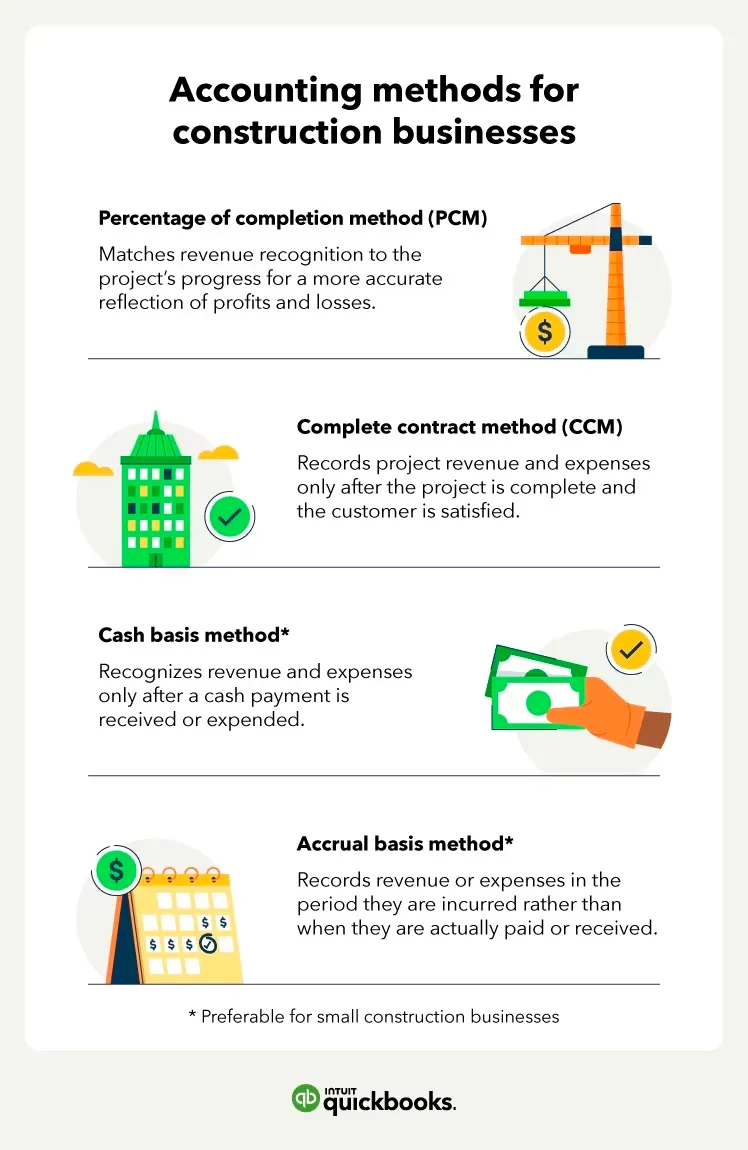How Construction Accounting Can Help You Stay on Track with Your Budget
How Construction Accounting Can Help You Stay on Track with Your Budget
Blog Article
Understanding the Relevance of Building And Construction Accountancy for Effective Job Monitoring

Role of Construction Accounting
Construction accounting acts as the backbone of monetary monitoring in the building sector, making sure that projects are completed within budget plan and economic objectives are met. construction accounting. This customized bookkeeping technique addresses the unique difficulties faced in building and construction projects, including varying job periods, fluctuating costs, and several stakeholders
Among the key roles of construction bookkeeping is to give accurate cost estimation and monitoring throughout the project lifecycle. This assists in educated decision-making, allowing job supervisors to readjust timelines and sources successfully. Additionally, construction bookkeeping enhances capital management by keeping track of accounts payable and receivable, hence guaranteeing that funds are available for timely settlements to subcontractors and providers.
It gears up task managers with the essential financial data to prepare thorough monetary declarations, which are important for audits and monetary testimonials. Eventually, the duty of construction bookkeeping expands beyond simple financial monitoring; it is essential to critical planning and operational efficiency, driving the success of building projects in an affordable landscape.
Secret Components of Building Audit

Budgeting develops an economic framework that overviews job implementation, enabling managers to allot sources successfully and prepare for potential monetary challenges. Accurate cost monitoring is important for monitoring expenditures in real-time, assisting to identify variances in between forecasted and real prices. This allows timely modifications to keep the task on budget plan.
Furthermore, financial coverage gives stakeholders with a clear image of the project's financial wellness. Regular reports, such as revenue and loss declarations and cash money flow evaluations, help with informed decision-making and improve transparency amongst all celebrations involved.
Furthermore, conformity with market regulations and audit requirements is important. This guarantees that economic methods are not just effective yet likewise authorized, protecting the company versus legal effects. By incorporating these key components, construction audit fosters a structured technique to managing funds, eventually adding to the effective completion of building tasks.
Benefits for Project Supervisors
Leveraging efficient building accounting methods supplies job managers with a wide range of advantages that boost both functional performance and monetary oversight. One substantial benefit is boosted spending plan monitoring. Exact monitoring of costs and earnings allows project managers to keep an eye on monetary efficiency in actual time, ensuring projects continue to be within spending plan and assisting in prompt changes when needed.
Moreover, building audit simplifies capital management, enabling project supervisors to enhance and expect financial requirements source allocation. By recognizing cash money inflows and outflows, they can much find out better take care of repayments to subcontractors, providers, and employees, therefore preventing expensive hold-ups.
Furthermore, durable accounting systems give extensive coverage abilities. Job supervisors can generate records that provide insights into task earnings, price differences, and source use. This data-driven method cultivates informed decision-making, permitting managers to determine potential issues proactively and read this post here implement restorative actions.
Lastly, adherence to building and construction audit standards makes certain conformity with legal and regulatory needs, minimizing the threat of disputes or charges. In general, reliable building and construction bookkeeping furnishes task supervisors with the tools needed to drive task success, enhance stakeholder self-confidence, and advertise lasting organizational growth.
Usual Challenges in Construction Bookkeeping
Lots of task managers experience considerable difficulties in building and construction bookkeeping that can impede job success. Among the main obstacles is the complexity of tracking multiple work websites, each with distinctive budget plans, timelines, and resource allotments. This needs precise focus to detail, which can be overwhelming without a durable accounting system in location.
In addition, fluctuating material expenses and labor prices can complicate budget monitoring, making precise forecasting hard. Task supervisors frequently struggle to reconcile these prices with real expenses, leading to possible monetary inconsistencies.
Additionally, building accounting involves conformity with different regulations, consisting of tax obligations and labor legislations. Navigating these guidelines can be difficult, particularly for supervisors that may not have a solid accountancy background.
Another substantial difficulty is handling money flow, which is important in the building sector. Delays in invoicing, settlements from customers, or unforeseen project adjustments can create capital shortages, endangering the project's development.
Lastly, reliable communication in between project supervisors, accountants, and area teams is crucial. Misunderstandings can lead to unreliable financial reporting, better complicating job management efforts. Addressing these obstacles proactively is vital for successful building and construction accountancy.

Best Practices for Effective Accounting
While browsing the intricacies of building and construction audit can be challenging, embracing ideal techniques can significantly enhance financial monitoring and task success. One essential technique is maintaining precise and timely documents. Implementing robust click for source audit software customized to building jobs can enhance data entry, invoicing, and reporting, lowering mistakes and conserving time.
Furthermore, developing a clear budget plan and regular monitoring against this budget plan are vital. Utilizing a system of periodic economic reviews allows project supervisors to determine variances early, assisting in prompt decision-making. It is also necessary to different job prices right into direct and indirect groups, allowing clearer understandings right into profitability.
An additional best practice entails fostering open interaction among all stakeholders. Routine updates and collective conversations about economic status can ensure every person is aligned and educated. Training staff in construction-specific accounting concepts further improves competency and accuracy.
Last but not least, making sure compliance with appropriate audit standards and laws is non-negotiable. Regular audits and interior testimonials add to transparency and liability, building depend on with clients and stakeholders. By concentrating on these ideal practices, building and construction companies can maximize their bookkeeping procedures, ultimately driving job success and economic security.
Conclusion
In final thought, building and construction bookkeeping plays an essential role in ensuring successful job management by helping with exact financial oversight and improving decision-making. By integrating crucial parts such as cost estimation, money flow administration, and conformity, task supervisors can browse typical challenges and leverage best practices for effective audit. Ultimately, a robust building bookkeeping structure not just safeguards spending plan honesty yet additionally adds to the total economic health of building jobs, fostering sustainable success within the sector.
By incorporating these vital parts, building audit cultivates an organized technique to managing economic resources, inevitably adding to the successful conclusion of building and construction jobs.
Accurate tracking of revenues and expenses permits project supervisors to monitor economic efficiency in real time, guaranteeing tasks stay within budget plan and helping with prompt modifications when needed.
Job managers can produce records that supply understandings into task earnings, expense variations, and source use.Numerous task supervisors come across considerable challenges in building and construction audit that can prevent job success. construction accounting. Ultimately, a durable construction audit structure not only safeguards spending plan integrity yet also contributes to the total financial health and wellness of construction tasks, cultivating sustainable success within the industry
Report this page